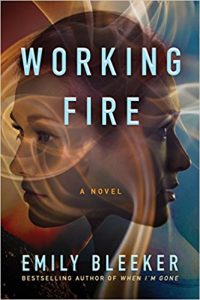I took all of my kids with me to Target today. Yeah, you all know what that is like–lots of requests, lots of “where is your brother?” and plenty of forgotten items on my list. As I was checking out, there was a woman ahead of me on the phone, clearly in a hurry, and the cashier wasn’t moving fast enough for her. She rolled her eyes, first to herself and then she looked at me as though I was going to play along with her “can you believe this” game. I gave her a smile and a shrug as I managed my kiddos who were blissfully unaware of the drama ahead of us and placed my last items on the belt. Then the woman slammed on the counter, making us all jump, and said “COME ON!!!! Push the button!”
The cashier was a young woman with dark, curly hair and adorable glasses and looked vaguely familiar. When the woman slammed on the counter, she jumped and turned around, confused. Then taking it all in she said, “I’m deaf!” and pointed to a small handwritten sign on her register that said: HELLO, I’m deaf.
The angry woman didn’t seem to care. She rolled her eyes at me again, and this time I looked at my feet. The cashier also looked to me with tears in her eyes, and I tried to give her a little okay sign and smile. I wish I’d done or said more. When the woman snatched her receipt and walked off in a huff, I took my place in front of the register. The young woman looked at me and mouthed, “I forgot my badge today. Everyone keeps getting mad. That’s why I made the sign.”
I remembered why she looked familiar. She’d checked me out before but with a little tag under her name that said: “I’m Deaf.”
I felt terrible about the way she’d been treated and tried to tell her that it wasn’t her fault. I tried to find a way to show her that she was doing a good job, but I don’t know that I helped much. We were both shook up, and I’m sure she went home feeling heavier that day.
As we were walking away, my kids asked me, “Mom, why was that woman so mean to her? Didn’t she see her sign?”
I ushered them out of the store and muttered something like, “She probably didn’t see the sign.” Or maybe she did–I didn’t know. It took me a moment but I soon realized the mistake I was making with my kids. I stopped my cart and crew in front of the giant red balls lining the street and looked into their concerned faces. I took a deep breath and tried to explain the best I could.
“Listen, it doesn’t even matter that she did or didn’t see the sign, we shouldn’t treat other people like that. We should treat all people with respect and understanding. Remember how the cashier said she usually has a tag on her badge? And remember, today she wrote that sign so people would know she couldn’t hear and so they would be patient? Well, in this case, that cashier couldn’t hear and was asking people to be helpful and understanding, but in this world, everyone has invisible differences. Everyone. We should treat others with respect, not just when we know about their lives but also because we don’t know about their lives. We can’t ever really know what is going on inside of another person. That’s why it is our job to be kind.”
Who knew Target could hold such an awesome opportunity to discuss empathy with my kids? Addictive home décor and $5 tee-shirts–yes–but life lessons? Not listed in the sale ad.
Empathy–it has become somewhat of a battle cry in my life. It is a skill I’m continually trying to teach my children and myself. Empathy is also important in my career. It is one of the things I love most about writing novels. For 300 or so pages you live inside someone else’s life. You get to experience their family, their secret heartache and their private dreams. If done well, the reader then also gets to walk down that same path, invested in the character’s successes and crying with their sorrows. It’s an amazing duality, this sharing of lives and feelings.
I think this is one reason I sincerely love writing a variety of characters—in storylines I have never lived and making choices I probably wouldn’t make myself. How very boring to read what Emily Bleeker, a Mormon mother of four, would do on a deserted island or losing someone to cancer or at an active crime scene. I promise you’d get tired of me pretty fast.
 But in WRECKAGE when Lilian is involved in a plane crash, she makes a decision that haunts her forever and makes the needle on her moral compass wobble. And in WHEN I’M GONE when Luke, an atheist, loses his wife of sixteen years he has to balance his idea of no afterlife with his children’s belief that their mother still exists. Or in WORKING FIRE when Ellie’s father has a stroke she is faced with the decision to give up on med school and move back to her small town or leave the burden to her sister and pursue her dreams.
But in WRECKAGE when Lilian is involved in a plane crash, she makes a decision that haunts her forever and makes the needle on her moral compass wobble. And in WHEN I’M GONE when Luke, an atheist, loses his wife of sixteen years he has to balance his idea of no afterlife with his children’s belief that their mother still exists. Or in WORKING FIRE when Ellie’s father has a stroke she is faced with the decision to give up on med school and move back to her small town or leave the burden to her sister and pursue her dreams.
Do they all make decisions that I’d stand behind if I were in their shoes? Maybe not. Do they make the same decisions you would? Only you know.
This variance is one of my favorite parts about Skyping with book clubs about my novels. I love listening to how everyone related to the characters and to what each person would have done in the same situation. It’s never the same twice and I can always tell when someone has made a deep connection with a character or situation. This particular type of book club participant doesn’t always defend the actions of the character, but they always defend the character–as a person. They look at the reasons for the choices that were made, and they want to know what happened after the words THE END showed up on the last page.
Believe it or not, these are the moments in my career that build my testimony the most, especially my testimony of the Savior. As I taught his words in Sunday School a few years ago, I came to have a deeper connection with his message than I ever had before. After thousands of years of detailed instruction, strict and sometimes harsh punishments and a lot of human interpretation of the Lord’s commandments, Jesus came with a clarifying message: “Love one another; as I have loved you” (John 13:34).
As we got deeper into our study of the New Testament, it became apparent that sometimes we use the gospel as a camera to take pictures of everyone else’s faults so we can compare them to our own and feel greater as a result. But Jesus taught us to use the gospel as a mirror to evaluate and improve ourselves rather than pick apart others. As a class, we took special note that when the Savior spoke to his followers, He talked of self-improvement and devotion to God and self-motivated obedience. And when He spoke to the Pharisees He talked about rejecting hypocrisy and putting on the glasses of compassion and empathy.
He illustrated this concept repeatedly in his mortal life. Like when He showed compassion to the woman taken in adultery he showed empathy for her, not necessarily agreeing with her choices but understanding and protecting her nonetheless. Or when he healed the lepers, the true outcasts of society, he didn’t just cure their physical ailments but also brought them back into a world that had shunned them. And when he gave sight to the man who was born blind, declaring that it was neither sin by his parents or by him that had caused the issue, he gave a clear message—often bad things happen no matter how righteous you are.
This quality of empathy and compassion is the birthplace of charity, the pure love of Christ. It is something I cherish seeing in my readers as I share my stories around the world with people from all backgrounds, faiths and upbringings. I see it in the members of that book club I chat with that cried with Luke when he mourned his wife. I feel it in those emails from readers who fell in love with Dave and whose hearts broke with Lillian. I hear it often in those quick Facebook messages from “somebody” begging to know what happened next to Jessie. All these diverse individuals are learning and practicing this increasingly rare but beautiful skill of understanding and caring for someone who is completely different from them.
So, maybe my characters aren’t like a Mormon stay-at-home mom of four kids who prefers playdates to ambulance rides–but I’m honestly pretty happy about that. As the Savior said, “For if ye love them which love you, what reward have ye?…And if ye salute your brethren only, what do ye more than others?” (Matthew 5:46-47)
 I look forward to hearing how the sisters in WORKING FIRE hopefully talk to and touch those who read their story and gain access to their inner world. I know Amelia and Ellie’s lives touched mine as I wrote of the day that changed them forever and of the unbreakable bond they shared even when death and betrayal loomed over them. I hope I can find out more about my readers and their lives through their connections with my characters and writing.
I look forward to hearing how the sisters in WORKING FIRE hopefully talk to and touch those who read their story and gain access to their inner world. I know Amelia and Ellie’s lives touched mine as I wrote of the day that changed them forever and of the unbreakable bond they shared even when death and betrayal loomed over them. I hope I can find out more about my readers and their lives through their connections with my characters and writing.
And I hope, more than anything, that every one of us can apply empathy to all areas of our lives. Then we can end up in a place where we don’t need hand-written signs or special nametags to treat someone with human dignity and kindness, because we will have learned the lesson King Benjamin imparts in Mosiah 4:16-19:
“Ye will administer of your substance unto him that standeth in need; and ye will not suffer that the beggar putteth up his petition to you in vain. . . .Perhaps thou shalt say: The man has brought upon himself his misery; therefore I will stay my hand . . . But I say unto you, . . .whosoever doeth this the same hath great cause to repent . . . and hath no interest in the kingdom of God. For behold, are we not all beggars?” (emphasis added)
Because I agree: We are all beggars. We are all that cashier at Target. We are all tagless–are we not?
 Emily Bleeker is a former educator who learned to love writing while teaching a writer’s workshop. After surviving a battle with a rare form of cancer, she finally found the courage to share her stories, starting with her debut novel, Wreckage, followed by the Wall Street Journal bestseller When I’m Gone, and Working Fire, which will be released Aug. 29. Emily currently lives with her family in suburban Chicago. Connect with her or request a Skype visit with your book club at www.emilybleeker.com.
Emily Bleeker is a former educator who learned to love writing while teaching a writer’s workshop. After surviving a battle with a rare form of cancer, she finally found the courage to share her stories, starting with her debut novel, Wreckage, followed by the Wall Street Journal bestseller When I’m Gone, and Working Fire, which will be released Aug. 29. Emily currently lives with her family in suburban Chicago. Connect with her or request a Skype visit with your book club at www.emilybleeker.com.
